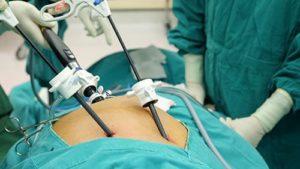Fundamentals of Laparoscopic Surgery
Fundamentals of Laparoscopic Surgery (FLS) is a program of Gerati designed to teach and evaluate the knowledge, judgment and fundamental skills for laparoscopic surgery, regardless of the surgical specialty. The Gerati has adopted the same module to train surgeons and gynecologists so they can perform minimal access surgery on their own after training.

Technical skills are essential for the practice of surgery. Performance in the skills laboratory must ultimately be predictive of performance in the clinical setting. They can be taught in the operating room and in the laboratory of surgical skills. The use of simulators allows the development of reproducible study plans with the measurement of performance using objective metrics.
FLS is a comprehensive web-based educational module that includes a practical training component and an assessment tool designed to teach the physiology, fundamental knowledge and technical skills required in basic laparoscopic surgery.
The objective of those who design metrics for the simulation laboratory should be to establish measures that are consistent with those of high-quality surgery in the operating room. It has undergone a rigorous evaluation to ensure that the evaluation component meets the appropriate standards to ensure the reliability and validity of the test.
FLS objectives
- Improve the quality of care received by patients undergoing laparoscopic surgery.
- Establish minimum standards for cognitive skills and basic techniques used in the performance of laparoscopic procedures.
- To provide surgeons who practice laparoscopy with standardized didactic information on the fundamentals of laparoscopic surgery and a tool to help develop judgment and manual skills.
- Create an objective and quantifiable measure to evaluate knowledge, judgment and manual skills in basic laparoscopic surgery.
- Make available to hospitals and institutions a validated tool to measure the knowledge and fundamental skills for the performance of laparoscopic surgery.
The manual skills component is based on the McGill Inanimate System for Training and Evaluation of Laparoscopic Skills (MISTELS). It has been demonstrated that this component complies with the reliability standards (interrater, test-retest and internal consistency) required for a high level examination. The content, the face, the construct and the criterion validity have also been established through a series of experimental studies. FLS presents a comprehensive learning package that is economical and of proven value for the teaching of minimally invasive surgery. Its unique contribution is the validated assessment included to ensure that those who take the program have demonstrated the knowledge and skills essential to perform laparoscopic surgery.
Recognizing the importance of improving the surgeon’s technical skills and patient safety, as well as the need for on-site training and testing, Geratiprovided the same quality training in the FLS program protocol, which will provide training and testing of quality directly in FLS Residency programs in general surgery for the next three academic years.

The FLS program has been validated as a means to train and evaluate the physiology, fundamental knowledge and technical skills of basic laparoscopic surgery. FLS is a comprehensive, web-based self-directed educational module (until recently, the program was based on CD) that includes a practical training component and an assessment tool. The study guides of the website cover the clinical theory, the interactive scenarios of the patients and the training of manual skills. Participation in the program has the advantage of potentially improving the trainee’s laparoscopic surgical skills in a safe environment through access to state-of-the-art surgical simulation, while helping the WLH address important curriculum and strength issues. labor.
Endotrainer boxes provide users with the opportunity to practice basic laparoscopic skills, improve hand-eye coordination and increase manual dexterity with object transfer, dissection and suture. The practical part of the examination consists of five manual surgical skills: pin transfer, precision cutting, placement and securing of the ligature loop, simple suture with extracorporeal knot and simple suture with intracorporeal knot. Authorized supervisors of the Simulation Center will help physicians practice these required skills repeatedly until competence and confidence are achieved. The use of the Simulation Center as a place of practice in a stress-free environment allows physicians to acquire the necessary skills to succeed in the exam after completing the training.
This program provides a set of standardized tasks that are considered the “gold standard” in the evaluation of surgical skills. In Geratiwe present a methodology to use all the tasks for the evaluation of the performance of the minimum surgical access tasks. The Evaluation Component is a two-part supervised exam that covers cognitive knowledge and manual skills. The cognitive component is a computer-administered 75-question multiple-choice time-sensitive test. The manual skills component evaluates skills based on the speed and precision of the surgeon’s maneuvers through the use of the laparoscopic training box. The purpose of this scientific design training is to determine the retention of performance after the initial and continuous training of the Fundamentals of Laparoscopic Surgery.
As minimally invasive approaches join the mainstream of general surgery, the fundamentals of laparoscopic surgery-based training are an integral component of the training of every general surgeon.
 Universal Bloggers
Universal Bloggers



